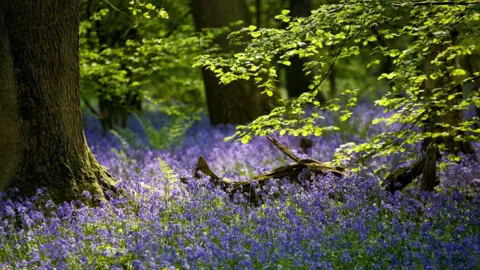Report calls for action to save woodland wildlife
 Getty Images
Getty ImagesUrgent action must be taken to avoid a loss of wildlife due to the "plummeting" condition of the UK's woodlands, according to a new report.
The report, published by the Woodland Trust on Tuesday, found that the quality of woodland is on the decline, despite a slight increase in tree cover.
Woodland covers 24% of Surrey, making it the most wooded county in England.
Abigail Bunker, director of conservation and external affairs at the trust, said: "We are calling on the government and others to invest in the management of our woodlands."
She said investing in woodland management would mean wildlife could experience the benefits "of these precious ecosystems".
Woodlands are becoming less effective as habitats for wildlife because they lack complexity, such as having enough trees of differing ages, states and sizes.
'Alarming' drop in biodiversity
Just one in every 50 native woodlands have more than one veteran tree per 200,000 square metres - the same area of about 28 football pitches.
It is these veteran trees that are especially valuable to wildlife because of their damage and decay features, which provide food and habitat.
"Alarmingly, many British woodlands have very few, if any, ancient and veteran trees left," said Ms Bunker.
"The nation's once rich, complex woodlands have become simpler and less biodiverse over time."
The number of woodland butterflies declined by 47% between 1990 and 2022 and dormice by 70% between 2000 and 2022.
Since 1975, the number of woodland birds has dropped by 37% and the variety of plants has reduced by 22%.
One problem affecting trees is pests - and there are now 121 different species which are attacking native trees, according to the trust.
The report predicts that climate change will allow these, and potentially other pest species, to thrive.
An estimated £919.9m is spent each year in the UK on managing only six pests, Ms Bunker said.
The trust said it wants "sensitive management" of UK woodlands to make them more resilient to an escalating suite of threats and unlock their ability to adapt to climate change.
Follow BBC Surrey on Facebook, on X, and on Instagram. Send your story ideas to [email protected] or WhatsApp us on 08081 002250.
